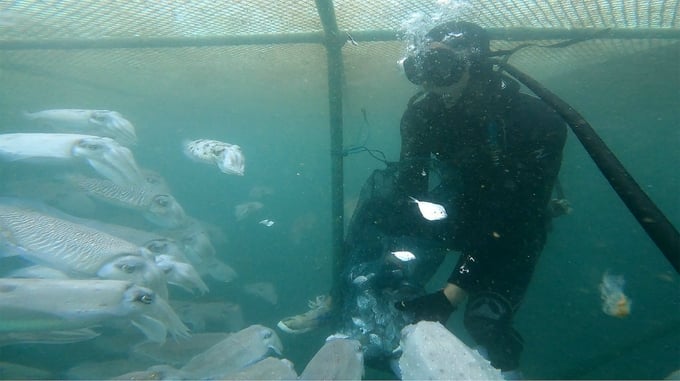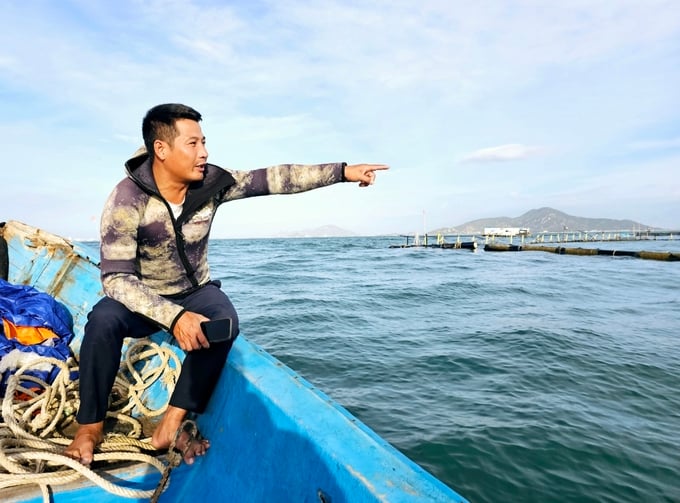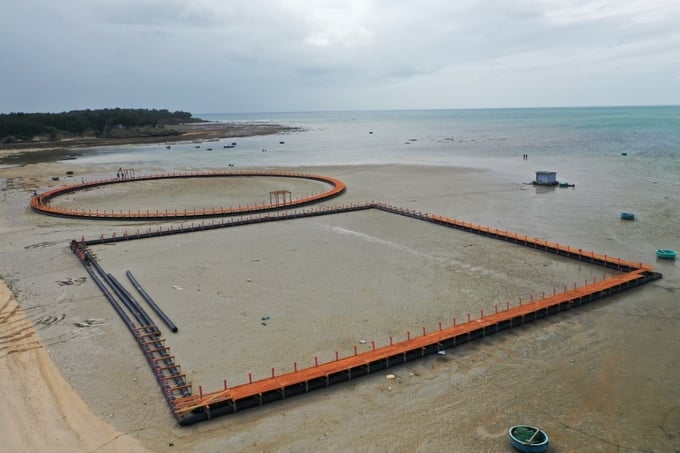May 21, 2025 | 07:03 GMT +7
May 21, 2025 | 07:03 GMT +7
Hotline: 0913.378.918
May 21, 2025 | 07:03 GMT +7
Hotline: 0913.378.918

Nguyen Ba Ngoc, CEO of East Sea Jumping Squid Joint Stock Company. Photo: Hoang Anh.
Last month, East Sea Jumping Squid Joint Stock Company unveiled semi-natural squid farming cages utilizing cutting-edge HDPE technology. These are currently the largest sea squid cages in Vietnam, perhaps even globally. A thriving sea squid farming ecosystem is emerging in the oceanic expanse, marking the realization of Nguyen Ba Ngoc's maritime vision.
On the day of the cage launch, Nguyen Ba Ngoc jubilantly recorded a video to showcase the achievement. Aerial views reveal structures resembling the My Dinh stadium being transported to the sea. The CEO of East Sea Jumping Squid shared that all these colossal cages were meticulously researched and designed by him, featuring proprietary technology unparalleled anywhere else in the world. Despite meeting standards akin to Norwegian sea farming technology, the cost is merely one-third, with the seine net system spanning from water surface to seabed, alongside an anchor rope system capable of withstanding Level 9 ocean waves. Additionally, a 1.5-meter-wide wooden flooring system provides pathways reminiscent of walking on solid ground.
Comprising three cages — one square and two round — these installations will culminate in a nearly 1-hectare aquatic enclosure amidst the vast ocean. Fisheries experts affirm that Nguyen Ba Ngoc's model represents the first instance of Vietnamese individuals deploying such large cages for open-ocean squid farming.

Nguyen Ba Ngoc has designated areas for breeding squid parents, breeding animals, and commercial stock.
Within these expansive enclosures, Nguyen Ba Ngoc has designated areas for breeding squid parents, breeding animals, and commercial stock. The 2024 target aims to yield approximately 50-100 tons of commercial squid and 10-20 million squid seeds. Furthermore, plans to lease approximately 100 hectares of oceanic surface for marine farming have been tabled before the leaders of Ninh Thuan province. This signifies that Nguyen Ba Ngoc's vision is evolving from a mere breeding endeavor into a fully-fledged marine farming ecosystem, wherein local fishermen will be key stakeholders.
We embarked on a tumultuous journey with Ngoc aboard the boat, heading towards the C3 sea area, approximately 7 kilometers from the Qinghai coast. Waves of excitement washed over us. Despite the challenging conditions, the CEO of East Sea Jumping Squid maintained a serene smile, remarking, "Soon, this sea will become the fishing ground for our seafaring community. But it won't be just fishing; our primary livelihood will be sea farming. Fishermen will have the opportunity to cultivate breeding stock and commercial squid, providing them with stable employment and alleviating the pressure on traditional fishing practices." I found myself pondering how Nguyen Ba Ngoc could accomplish such extraordinary feats. He isn't a scientist, nor does he possess a multitude of research projects, yet he continues to astound experts with his ingenuity.
In the heart of this expansive ocean, Ngoc plans to initiate an investment call for an area of approximately 1 hectare to establish a fully natural sea farming model. Within a colossal cage, parent squid will be released to reproduce naturally, aiming to restore the marine ecosystem and demonstrate that humans can coexist harmoniously with the sea. Ngoc envisions a future where the sea becomes a boundless source of prosperity for people.
As we traversed the fishing villages of My Tan and My Hiep, Ngoc shared an anecdote about our initial visit. Upon arrival, the fishing village was inundated with waste, and villagers resorted to destructive fishing practices out of desperation. Ngoc recounted how, alongside commune authorities and border guards, they mobilized efforts to clean up the trash, transition to sustainable fishing methods using nets and lines, and secure higher prices for their products. Over time, real change took root.

In addition to squid farming, Ngoc has pioneered a model for cultivating white-leg shrimp in open waters.
In addition to squid farming, Ngoc has pioneered a model for cultivating white-leg shrimp in open waters. This initiative aims to demonstrate that with intelligence and determination, the sea can yield bountiful results, free from the environmental hazards and exorbitant costs associated with bay farming. While the challenges posed by waves and winds may be formidable, Ngoc believes that through perseverance and ingenuity, humans can conquer and steward the forces of nature, realizing a grand vision of sustainable oceanic prosperity. With each passing day, Nguyen Ba Ngoc's trailblazing path on the sea attracts more companions eager to join the journey.
Le Van Hoan, a fisherman from My Hiep village who works with Ngoc, expressed his delight, saying, "Now, whenever the fishing village spots debris in the sea, everyone pitches in to collect it and dispose of it properly. Gone are the days of using destructive methods like pounding rakes or electricity. Every villager understands that every squid or small fish left in the sea contributes to our long-term livelihood. From the Qinghai Sea, the fishing community, in harmony with East Sea squid, is blossoming. Their love for the sea grows stronger because they know that love is what protects their lives."
As for Nguyen Ba Ngoc, his sea squid farming startup model has garnered numerous accolades, including the Outstanding Young Entrepreneur Award, the Luong Dinh Cua Award, and the Innovation Award in the Seafood Mining and Processing Industry. However, the CEO of Bien Dong Jumping Squid Joint Stock Company revealed that his proudest achievement is making a small contribution to the daily transformation of fishermen. "To be honest, I still don't know the extent of my success, but even if I fail, if I can still help people change for sustainable development, I have no regrets," Ngoc declared resolutely, amidst the roar of the ocean waves.
Reflecting on the first project area in the open sea, Ngoc revealed that immediately after the cage launching ceremony, Dai Thuan Group continued to invest capital with the condition of purchasing all products. The trajectory of squid farming in open seas is becoming increasingly clear and is steadily completing its chain. The forthcoming strategy will focus on establishing farming areas, with Ngoc firmly believing that Ninh Thuan can emerge as a leading exporter of high-quality sea squid, alongside various other squid-based products.
Vietnam boasts superior natural conditions, potential, and advantages for sea squid farming compared to other countries in the region and worldwide. With decades passing without significant storms in Ninh Thuan's waters, an expansive water fund, and the ongoing development of human resources for marine farming, a comprehensive marine farming strategy is taking shape, positioning Vietnam at the forefront of this burgeoning industry.

Comprising three cages — one square and two round — these installations will culminate in a nearly 1-hectare aquatic enclosure amidst the vast ocean.
After establishing the raw material area, the next step will be the creation of a processing factory and scientific projects dedicated to researching squid cysts and ink sacs for both food and medicine. This aims to establish a circular economic chain within the sea squid industry. Numerous scientists have affirmed that squid cysts and ink sacs can be developed into medicinal products that aid in reducing blood cholesterol, preventing cancer cell development, and offering various other oriental medicine remedies. The challenge lies in ensuring an adequate supply and effective preservation methods. The abundance and agility of jumping squid in the East Sea make this endeavor feasible.
In the near future, it is anticipated that Japanese, Korean, and many other international entities will express interest in collaboration. Moreover, domestic investors, including those who initially rejected Ngoc's startup project, are eager to invest capital, regardless of the amount. However, Nguyen Ba Ngoc maintains that, even in the face of adversity, his sea dream remains rooted in core values for the fishermen, transcending mere monetary gain. His ultimate goal is to empower fishermen to tread the same path as him, fostering a sense of security and certainty at sea, which he believes will yield greater dividends than financial wealth. Fishermen, he asserts, possess an unparalleled understanding of and connection to the sea, making their involvement crucial in nurturing and protecting maritime sovereignty. Each additional livelihood, each additional coin earned at sea represents a collective effort to safeguard the ocean.
Ngoc's vision extends beyond the borders of Vietnam, encompassing vast seas and international waters. He envisions a phased approach, with initial focus on regions such as Ninh Thuan, Khanh Hoa, Phu Yen, and Binh Dinh, followed by expansion to areas like Quang Ninh and Hai Phong. Eventually, Ngoc envisions extending his initiatives to the Gulf of Thailand and beyond, with interest from ambassadors and investors from places like Angola and Qatar. However, Ngoc acknowledges that these are aspirations for the future.
Perhaps this is the grander dream of Nguyen Ba Ngoc – the individual who dared to unlock the potential of the sea. It embodies the aspirations of a seafaring nation, tethered to their homeland's waters day and night.
Translated by Quynh Chi

(VAN) Khanh Hoa is investing over 545 billion VND to develop 240 hectares of high-tech marine aquaculture in order to guarantee a consistent supply of seafood exports and achieve the USD 1 billion target.

(VAN) Minister of Agriculture and Environment Do Duc Duy held a meeting with Soopakij Chearavanont, Chairman of C.P. Group, on May 15.
/2025/05/16/3800-0-nongnghiep-143756.jpg)
(VAN) Suntory PepsiCo Vietnam coordinated with the Ministry of Education and Training to implement an education program on water conservation, reaching nearly 1 million primary school students nationwide.

(VAN) Vietnam’s TH Group officially put its high-tech fresh milk processing plant into operation in the Russian Federation, marking a historic moment as the first TH true MILK cartons were produced in Russia.

(VAN) Use of high-quality broodstock and biotechnology is regarded as the most effective approach to ensuring sustainable and economically viable shrimp aquaculture ahead of climate change and the emergence of increasingly intricate disease patterns.

(VAN) Carbon farming is a form of agricultural practices that helps absorb more greenhouse gases than it emits, through smart management of soil, crops, and livestock.

(VAN) This is a key content of the Memorandum of Understanding recently signed between the Vietnam Fisheries Society and Kunihiro Inc of Japan.